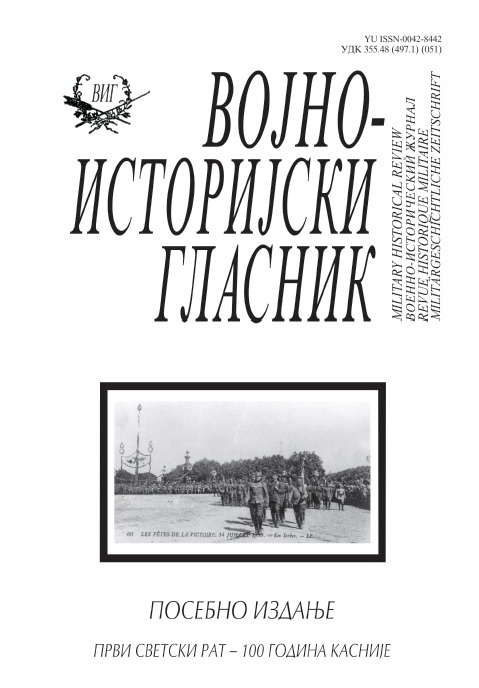ВОЈНИ СВЕШТЕНИЦИ СРПСКЕ ВОЈСКЕ У ВЕЛИКОМ РАТУ (1914–1918)
SERBIAN ARMY MILITARY CHAPLAINS DURING THE GREAT WAR, 1914–1918
Author(s): Miljan MilkićSubject(s): Military history
Published by: Institut za strategijska istraživanja
Keywords: Serbian Army; military chaplain; religious service; the First World War; Thessaloniki Front
Summary/Abstract: The religious service in the Serbian Army during the First World War was organized to facilitate the exercise of religious rights for the Serbian Army members. It was the continuation of organizing religious services in the Serbian Army, which has institutionally started in 1839. Solutions adopted by the Serbian state and military authorities for regulating the rights of religious minorities in the Principality and Kingdom of Serbia provided unrestricted li‐ ving and meeting the needs of members of all religious groups. Serbian Army chaplains were commissioned officers in military unites and in the hospitals. Chaplains minister to soldiers in spiritual support and they have an important role in moral guidance through formal teaching, counsel, and personal exam‐ ple. During the First World War, in the period from 28 July 1914 to 11 Novem‐ber 1918, the Serbian Army had 205 Orthodox parish priests, 24 hieromonks, two deacons with the rank of hierodeacon, two imams and a rabbi, which ma‐kes a total of 234 chaplains. The religious needs of soldiers in the Serbian Army were regulated through different segments of everyday life in the bar‐racks and the military camp. Regulation of the religious needs of members of the Serbian Army of different confessions was aimed at strengthening the combat morale and creating the modern Serbian Army. With the arrival of a large number of volunteers on the Thessalonica front, the Serbian Army was increasingly becoming multinational and multiconfessional. There were more and more volunteers from Roman Catholic, Muslim, Protestant and Jewish fa‐iths, who mostly declared themselves as Yugoslavs. Although until the end of the First World War, the Serbian military authorities did not have their mili‐tary priests, their efforts to regulate the religious needs of soldiers of the Ro‐man Catholic and Protestant faith represented an important basis for their in‐stitutional regulation in the Kingdom of Yugoslavia. The initiative for the rele‐ase of all the chaplains from the Army was launched in November 1918. The reason for this was first of all because during the First World War many paris‐hes remained without priests. A large number of priests died or were killed. On 6 December 1918, the Chief of Staff of the Supreme Command proclaimed an order to release from the duties all chaplains in military units. Since the demo‐ bilization of the chaplains did not take place with the expected dynamics, in‐tensive correspondence between the Metropolitan of the Serbian Church and the Army Minister took place during January, February and March 1919.
Journal: Vojnoistorijski glasnik
- Issue Year: 2019
- Issue No: poseban
- Page Range: 207-225
- Page Count: 19
- Language: Serbian

